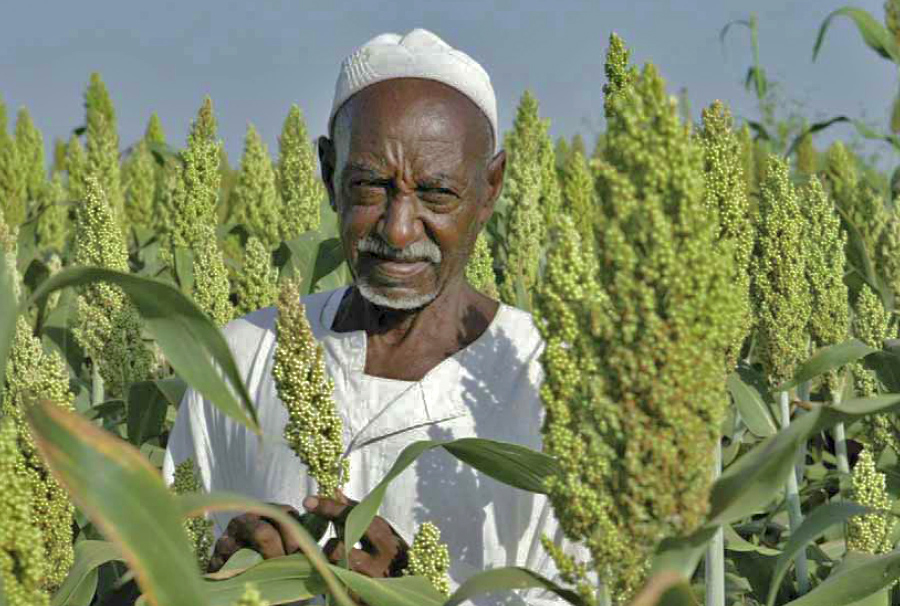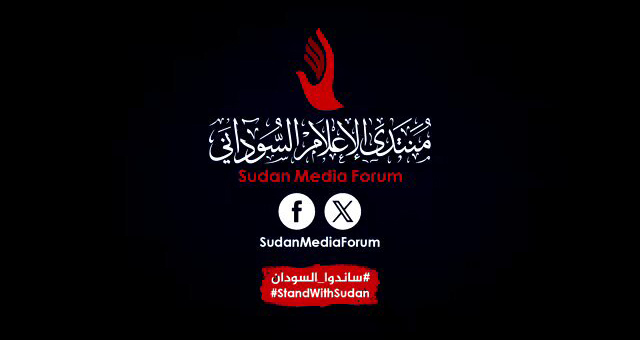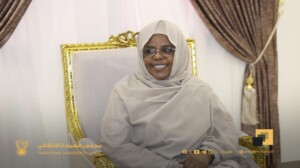Farmers battle war’s economic scars to revive central Sudan farmlands

A farmer in a field of sorghum in the Al-Jazeera / El Gezira Agricultural Scheme (File photo: FAO)
Prepared by Ayin Network for Sudan Media Forum
In central Sudan, farmer Omar Qouz is preparing for his first planting season since conflict erupted, battling fears of failure as he and thousands of others in Sennar and El Gezira states face collapsed irrigation, halted funding, and a severe lack of farm equipment.
Qouz, cultivating land in Sennar’s El Suki Agricultural Project, told local news outlet Ayin that returning to his farm, which has been scarred by war for two years, is his “sole source of livelihood.”
As the summer agricultural season approaches, land preparation in El Gezira and Sennar – home to Sudan’s largest farming schemes – appears minimal, threatening reduced cultivation despite local government pledges for a successful season.
Farmers are most concerned about the absence of bank financing. Many carry pre-war debts, making new loans difficult to secure. Compounding the issue, the Agricultural Bank has demanded repayments, even imprisoning some farmers in El Gezira state, Ayin reported.
El Gezira and Sennar have endured severe disruption since the paramilitary Rapid Support Forces (RSF) swept through in December 2023. The invasion brought farming to a near standstill, with widespread looting of machinery, fertilisers, pesticides, and harvested crops. This loss, coupled with mounting Agricultural Bank debts, makes returning to the land perilous, even in areas the Sudanese army has recaptured.
Sennar’s state government has pitched an “intensive” agricultural plan for this year, seeing farming as vital to exiting the economic crisis. The state’s Minister of Production and Economic Resources, El Hadi El Sadiq, announced early preparations for the 2025 season “despite the challenges.”
Infrastructure and funding woes
However, these promises have limited impact on the ground. Qouz highlighted systemic problems in El Suki, especially its dilapidated irrigation system.
“The project covers 124,000 feddans (approx. 52,000 hectares) and relies on four dilapidated pumps dating back to its establishment in 1970,” he told Ayin. “Attempts were made to maintain them, but the new pumps do not conform to specifications.”
“Main irrigation canals have collapsed, ditches need clearing, and the entire irrigation system needs rebuilding,” he added. “If the government wants to avoid a failed season, it must urgently rescue the irrigation system.”
Qouz also pointed to the funding obstacle. In 2022, a farmers’ initiative received about one trillion Sudanese pounds from the Agricultural Bank for fertilisers and diesel. “Members of this initiative, many of whom are not real farmers, did not repay the loan, which has deprived serious farmers of funding until now,” he said. Qouz also criticised agricultural unions, accusing National Congress Party affiliates of dominating them since the 1990s and focusing on strengthening their influence instead of addressing farmers’ problems.
The situation is no better in Sennar’s Kassab Agricultural Project. Farmer Abdel Ilah El Noor lamented the lack of government preparations, particularly for clearing irrigation canals. “Unfortunately, neither the Blue Nile Irrigated Projects management nor the state has made any preparations,” he told Ayin. “The ‘Rowena’ irrigation pump is ready, but the project’s infrastructure, especially the irrigation canals, is completely collapsed.”
El Noor said promises from an investor to finance operations evaporated due to high costs. He confirmed that farmers have carried out initial cleaning operations but “are waiting for someone to fund them, as they have no other source of livelihood than agriculture.” An upfront electricity bill payment adds another burden.
Debt and desperation in El Gezira
In El Gezira State, farmers face similar funding challenges, according to Salman El Hadi from the El Gezira project. “Farmers are living in extreme fear due to the Agricultural Bank’s demand for pre-war debts, which they could not repay due to the failed harvest season and RSF looting of crops,” he told Ayin.
“Farmers in El Qurashi locality were recently imprisoned due to complaints from the Agricultural Bank,” he added, worriedly. “These measures are expected to affect thousands of defaulters, threatening to derail the agricultural season unless urgent action is taken.”
The El Gezira and El Managil project, founded in 1925 and spanning 2.2 million feddans (approx. 924,000 hectares), is one of Africa’s largest irrigated schemes, supporting millions of Sudanese.
Expert views: high costs, scarce support
Agricultural engineer Mohamed Osman believes a lack of funding and rising input costs threaten self-sufficiency. He noted the unavailability of tractors for land preparation and steadily increasing diesel prices. “Funding available under company or bank conditions has a negative impact due to the high cost of inputs, which pushes farmers to reduce cultivated areas and focus on less costly crops like sorghum, affecting diversity and productivity,” he told Ayin.
Engineer El Tayeb Abdallah, manager of an agricultural input company in Sennar State, confirmed that rapid currency fluctuations have led to a significant rise in input prices, causing huge losses for companies. Regarding fuel, he told Ayin: “The problem is not so much its availability as it is in obtaining approvals for it. Furthermore, the cost of diesel and fertilisers is very high, and fuel itself is scarce.”
Abdullah stressed that rain-fed agricultural localities like Dali, Mazmum, Dinder, and El Suki experienced widespread looting of crops and machinery by RSF forces, resulting in massive financial losses for farmers. Irrigation projects also suffered significant damage to pumps and canals. Areas like Dali and Mazmum still face security deterioration due to their proximity to RSF-controlled areas, casting a dark shadow on the upcoming summer season.
A Glimmer of hope
Despite the grim outlook, Engineer El Tayeb Abdallah anticipates cotton will be cultivated over 400,000 feddans (approx. 168,000 hectares), and sorghum and sesame over larger areas in Dinder, East Sennar, and El Suki localities. He concluded: “There is optimism among some citizens who have sold personal belongings to finance their cultivation, but the general halt in agricultural production remains the dominant feature.” While farmers in central Sudan courageously struggle to bring life back to their lands, the absence of financial support, dilapidated infrastructure, security threats, and harsh banking practices could turn their hopes into a mirage. The upcoming agricultural season hinges on urgent and radical interventions to ensure the livelihoods of millions who depend on this land.

This report is prepared by Ayin Network and published via the platforms of Sudan Media Forum member organisations, to highlight the challenges faced by farmers in El Gezira state in their efforts to make the agricultural season a success..
#SilenceKills #الصمت_يقتل #NoTimeToWasteForSudan #الوضع_في_السودان_لايحتمل_التأجيل #StandWithSudan #ساندوا_السودان #SudanMediaForum #PressFreedom











 and then
and then